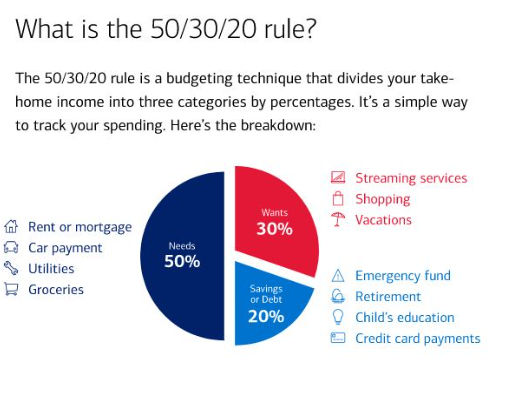
Tenant Newsletter
October 2022

How to Create a Budget - Needs, Wants, Savings & Debt
Step 1: Calculate your net income
The foundation of an effective budget is your net income. That’s your take-home pay—total wages or salary minus deductions for taxes and employer-provided programs such as retirement plans and health insurance. Focusing on your total salary instead of net income could lead to overspending because you’ll think you have more available money than you do. If you’re a freelancer, gig worker, contractor or are self-employed, make sure to keep detailed notes of your contracts and pay in order to help manage irregular income.
Step 2: Track your spending
Once you know how much money you have coming in, the next step is to figure out where it’s going. Tracking and categorizing your expenses can help you determine what you are spending the most money on and where it might be easiest to save.
Begin by listing your fixed expenses. These are regular monthly bills such as rent or mortgage, utilities and car payments. Next list your variable expenses—those that may change from month to month, such as groceries, gas and entertainment. This is an area where you might find opportunities to cut back. Credit card and bank statements are a good place to start since they often itemize or categorize your monthly expenditures.
Record your daily spending with anything that’s handy—a pen and paper, an app or your smartphone, or budgeting spreadsheets or templates found online.
Step 3: Set realistic goals
Before you start sifting through the information you’ve tracked, make a list of your short- and long-term financial goals. Short-term goals should take around one to three years to achieve and might include things like setting u
p an emergency fund or paying down credit card debt. Long-term goals, such as saving for retirement or your child’s education, may take decades to reach. Remember, your goals don’t have to be set in stone, but identifying them can help motivate you to stick to your budget. For example, it may be easier to cut spending if you know you’re saving for a vacation.
Step 4: Make a plan
This is where everything comes together: What you’re actually spending vs. what you want to spend. Use the variable and fixed expenses you compiled to get a sense of what you’ll spend in the coming months. Then compare that to your net income and priorities. Consider setting specific—and realistic—spending limits for each category of expenses.
You might choose to break down your expenses even further, between things you need to have and things you want to have. For instance, if you drive to work every day, gasoline counts as a need. A monthly music subscription, however, may count as a want. This difference becomes important when you’re looking for ways to redirect money to your financial goals.
Step 5: Adjust your spending to stay on budget
Now that you’ve documented your income and spending, you can make any necessary adjustments so that you don’t overspend and have money to put toward your goals. Look toward your “wants” as the first area for cuts. Can you skip movie night in favor of a movie at home? If you’ve already adjusted your spending on wants, take a closer look at your spending on monthly payments. On close inspection a “need” may just be a “hard to part with.”
If the numbers still aren’t adding up, look at adjusting your fixed expenses. Could you, for instance, save more by shopping around for a better rate on auto or homeowners insurance? Such decisions come with big trade-offs, so make sure you carefully weigh your options.
Remember, even small savings can add up to a lot of money. You might be surprised at how much extra money you accumulate by making one minor adjustment at a time.
Step 6: Review your budget regularly
Once your budget is set, it’s important to review it and your spending on a regular basis to be sure you are staying on track. Few elements of your budget are set in stone: You may get a raise, your expenses may change, or you may reach a goal and want to plan for a new one. Whatever the reason, get into the habit of regularly checking in with your budget following the steps above.

Mummified Meatballs in Crispy Potato Skin Coffins Recipe | Allrecipes

Ingredients
2 medium russet potatoes
4 teaspoons olive oil
1 teaspoon dried Italian seasoning
4 teaspoons grated Parmesan cheese
12 frozen cooked meatballs (such as Johnsonville®), thawed
4 (1 ounce) sticks string cheese sticks, pulled into thin strips
8 candy eyeballs
Directions
Instructions Checklist
Step 1
Preheat the oven to 400 degrees F (200 degrees C).Step 2
Pierce potatoes with a fork and microwave for 10 minutes. Let cool until safe to handle. Cut in half lengthwise and scoop out most of the flesh, leaving 1/2 inch around the shell. Discard flesh or save for another use.Step 3
Place potato halves cut-side down on a baking sheet. Rub each half with 1 teaspoon olive oil. Flip potatoes over. Sprinkle each with 1/4 teaspoon Italian seasoning and 1 teaspoon Parmesan cheese.Step 4
Bake in the preheated oven until the shells are crisp, 12 to 15 minutes.Step 5
Meanwhile, place meatballs on microwave-safe plates. Cover with paper towels. Microwave until hot, 70 to 75 seconds per batch. Let rest until cool enough to not melt the cheese.Step 6
Wrap 1/4 of the cheese strings around 3 meatballs to create a mummy effect. Repeat with remaining cheese and meatballs.Step 7
Remove potato skin coffins from the oven and place a mummy in each coffin. Apply candy eyeballs.

And how can you help?
By Steve Gamel
Throughout the month of October, individuals and organizations large and small all over the world will come together to support Breast Cancer Awareness Month. But what is this important month of the year, exactly? More importantly, how can you help?
According to the National Breast Cancer Foundation, breast cancer is the most commonly diagnosed cancer in women, with one in eight women being diagnosed in her lifetime. While breast cancer is the second leading cause of cancer death among women, there are still over 3.5 million survivors alive in the United States today.
Much of that increase in survivors can be credited to Breast Cancer Awareness month. This is a worldwide campaign that highlights the importance of year-round education, early screenings and detection, and raising funds for pivotal research and improved treatment options. The National Breast Cancer Foundation has reported a rise in funding almost every year for nearly a decade.
According to regiscollege.edu, online activity like Google searches related to breast cancer increases significantly each October.
When women are aware of their family history and are performing regular mammograms, they have the best opportunity to diagnose quicker and have a higher survival rate.
The best part is that it's really easy to get involved and make a difference.
Educate yourself on the facts and symptoms
Get screened; encourage family members to get screened
Make a one-time or monthly donation
Corporate sponsorships
Host a fundraiser
Donate your hair
Campaign to help women gain access to the cancer drugs they need
Volunteer to help local or national organizations
Share stories of loved ones who have been affected by breast cancer
Share educational content on social media
Wear pink to raise awareness and show support

PLEASE REMEMBER TO KEEP YOUR RENTER’S INSURANCE POLICY CURRENT AND UP TO DATE! All tenants and occupants 18 years and older must have renters insurance.
Please send us a copy of your renewed policy so we can add to your portal:

Written communication is best! When you have questions or concerns related to your lease, policies or procedures, please email to office@3gpropertiesgroup.com. 3G personnel will respond within 48 business hours. Thank you!

Tips & Reminders
Maintenance requests MUST be in writing so please use your tenant portal. Photos can also be uploaded to support your maintenance requests. Report any leaks so minor problems don’t turn into major ones.
We have a new process for submitting emergency work orders.
For emergencies only, please call (713) 352-3768. Messages left will be checked after hours and on weekends. Please submit a work order as well. Please make note of this change.
Maintenance emergencies are:
Major Water Leak (shut off water immediately)
Heat is out and it is below 55 degrees
AC is out and it is above 85 degrees
Toilets: None are working (not just one)
Sewage backup throughout (not just a clogged drain)
Broken windows and doors (not lockouts)
Electrical: Outages (not caused by the power company or weather related) that affect major parts of the home
The HVAC systems can only perform within a 20 degree differential. If it's 100+ and you want your house to cool to 70 then you might want to invest in a portable a/c unit that you can move from room to room to create an even cooler environment.
We service each of our rental properties quarterly or semi-annually for filter changes, smoke alarm testing and property walk throughs. This is a requirement of your Landlord and to ensure the safety and condition of your home. If you refuse service, do not allow access to your rental property, do not leave your keyless deadbolt unlocked or do not safely secure your pet in its crate, a $65 trip charge will be added to your rental account.
If you are ever locked out of your rental property, it is your responsibility to contact and pay for locksmith services. This is not a maintenance request (see above).
Do NOT pour oil or grease down any drains including garbage disposals to prevent clogs and repairs being charged back to tenants due to misuse.
“Flushable” Wipes — and Almost Everything Else — Are Not Flushable. Here is a simple truth. Sewer systems were designed to handle two things — human waste and toilet paper. Flushing wipes increases the chances that the pipes will get blocked and cause serious problems for the sewer system in general. Repairs caused by misuse will be charged back to tenants.
Per your Lease Agreement, all tenants and occupants 18 years and older need their own separate Renter’s Insurance Policy or on a combined policy naming all tenants and occupants as insureds. 3G Properties Group should be named on your policy as an “additional interest” so your insurance company will automatically send us your proof of insurance and any changes or updates. If all tenants are not named on the insurance policy or we do not have a copy of your policy on file, there is a mandatory $12.50 landlord’s liability insurance policy charged to your rental property each month to be included in your rent payment. Tenant’s personal property is not protected unless Tenant has their own RENTERS INSURANCE.
DUE TO LIABILITY, UNDER NO CIRCUMSTANCES SHOULD ANY TENANT OR OCCUPANT ACCESS THE ATTIC OF THE PROPERTY FOR STORAGE OR ANY OTHER PURPOSE. You are not allowed to change your AC filters if they are located in the attic space or above 6 feet from the ground.
No temporary or above ground pools of any kind or trampolines are permitted on the property per your Lease Agreement, paragraph 12D.
Tenant must kennel or crate pets whenever landlord or landlord’s representative will be on property for a scheduled appointment. If not, there will be a $65 trip charge added to your rental account.
If you have an addition to your family, i.e. new baby, please let us know so we can add them as occupants. We will need their name and date of birth. Any occupants 18 or older are required to complete a rental application for approval prior to them moving in.
Please make all payments through your portal. We do not accept personal checks.

Want to buy your next home?
3G Properties Group wants to be your full-service Realtor®. Our team is a top producer, experienced and knowledgeable to assist clients with purchasing and selling their homes in addition to our property management services. We can guide you through the steps, put you in touch with one of our preferred lenders and help you improve your credit so you can purchase your next home. When you are ready to step into home ownership, please let us know.





